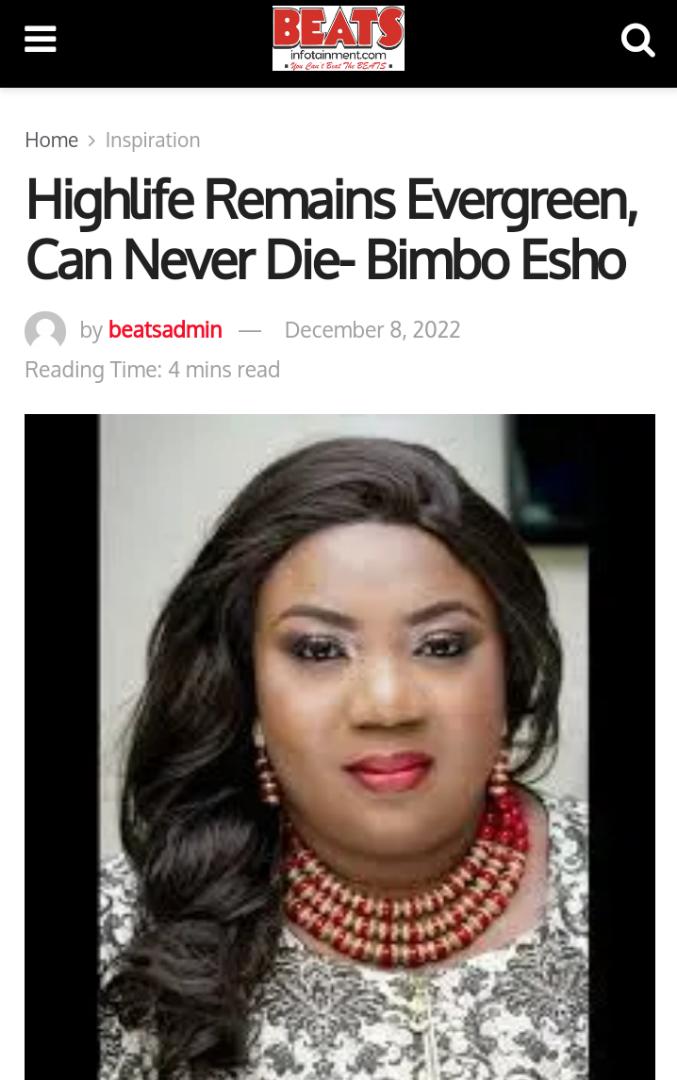Beautiful, incredibly intelligent and business savvy, Bimbo Esho has successfully dared and seemingly conquer the odds and challenges in the male dominated Nigerian industry.
Definitely, a true chip of the old block, since taking over the runnings of her father’s multimillion musical library and vast collection of Nigeria and West African music, she has not stopped astounding the Nigerian music and entertainment industry aficionados, with her uncommon verve, resourcefulness and infectious passion for her job.

In this exclusive interview with *BEATS MAGAZINE’s* Online Editor, *AKEEM BUSARI*, she restated her commitment of driving forward, the dreams her just retired father, Chief Femi Esho, who is widely renowned as the encyclopedia of highlife and other indigenous genre of music in Nigeria, has West Africa.
She also spoke on varied issues, including the plans of her company, Evergreen Music Company Limited, to help rejig highlife music, which she declared would never die, as well as, reawakening the love of music lovers for live band music. Even as she also praised Ogun, Lagos and Osun government agencies for supporting music and the arts.
Enjoy the interesting interview!
How do you rate the last program you had; the tribute banquet for Jimi Solanke?
The last event on Evergreen Music Platform held a month ago and the theme was ‘The Grandmaster, Celebration of Sir Jimi Solanke’. The event was fantastic and we thank the Ogun State Government for the support shown to one of their sons. They supported the production of Baba Jimi Solanke musical works and Photojournal that chronicles his Life and Times.
What were the reasons behind organising the event for Jimi Solanke?
Our vision in Evergreen musical company is to ensure the legacies of Evergreen iconic musicians don’t go into extinction and we have been at the forefront of promoting and celebrating many of them, whether dead or alive. We believe Sir Jimi Solanke has paid his dues and deserves celebration.
What is new on the cards for Evergreen Music Co?
We have so much in the pipeline and they will be unveiled with time.
Tell us briefly about yourself; academic and family background
I am a lady whose creative ingenuity keeps me going. I attended Mayflower School Ikenne and later University of Ibadan for my Bachelor degree program with a final year thesis on Highlife Music as a Medium for Social reform. My dad, Mr Femi Esho is the largest music collector in Nigeria and he is the chairman of Evergreen Musical Company.
Let’s have your perspective on this: Nigerian movies and music stars are doing well abroad, but on the home front, nothing seems to be happening.
What we are experiencing in the movie and music industry are the effects of the digital age. It has helped showcase our creative minds to the world. We don’t have problem here in the homefront, once we have more people in government and corporate who genuinely love the arts, then things will look up better for us in the homefront.
What can the government do to develop the entertainment industry?
Just like Lagos, Ogun, Osun and other government agencies we have had partnership with, if other States gets more involved in partnership with us, the stakeholders, we will be able to advise them and continue to act as an interface with them by relating better to them what those in the creative field yearns for. Doing this, will grow musical tourism in Nigeria.
Evergreen Music Company, is one of its kind in Nigeria. What’re some of the challenges you’re facing in terms of patronage and copyright?
We don’t and have never had issues with copyright . We manage the Estate of some big shots in the music industry and we have good relationship with them. The advent of digital marketing could have created an issue of low patronage but we have since combated that even before it came.
Highlife is your niche in this business; how can the huge catalog from way back, be digitilised and preserved for posterity?
This is a brilliant question. We don’t just do Highlife even though that is my dad’s first love. We have the largest catalogue of Nigerian and and African music in Nigeria.
We have started digitalizing and putting up an anthology of Nigerian music for the past few years and that is a huge process. But we are optimistic that with partnership from relevant bodies, be it government or corporate, we shall be able to put this into the public space soon for all to see the wealth of music we have as a nation. Music from different ethnic groups.
Let’s get a bit personal; What’re your favourite colours, food and holiday location?
Favourite colour depends on my mood ooo. Sometimes, I like it loud like pink, red, yellow and other times, I want just black. I love rice and vegetable. I love visiting places where I can see wildlife, do research and also watch live bands.
You’re a woman and the CEO of a company in the entertainment industry. How easy or challenging has it been for you, doing business in this competitive industry?
No competition at all in my chosen field. Interestingly, I am the only lady in this country, doing what I do with music. My dad has laid the foundation. And I am only continuing where he stopped and taking it to the next level.
To what do you attribute the lull in live performances?
There hasn’t been a lull. As it seems, liveband is still very much alive. Artistes do play at events and clubs. The only issue is that those playing live music need to be more original in their compositions. Also more programs can be put together to promote liveband culture. Some of our events like Ariya Eko, Thrillerbandz, Faaji Agba Eko, etc all were put together to promote liveband.
Do you honestly think, highlife music can regain its past glory in Nigeria? And which are the ways forward?
Of course, Highlife music has been regaining it’s seemingly lost glory. Many of today’s music have elements of Highlife in them. Also, some old Highlife songs have mutated into new forms with more danceable beat. Highlife Music can’t die. Just like few other genres too, they only will take new forms




